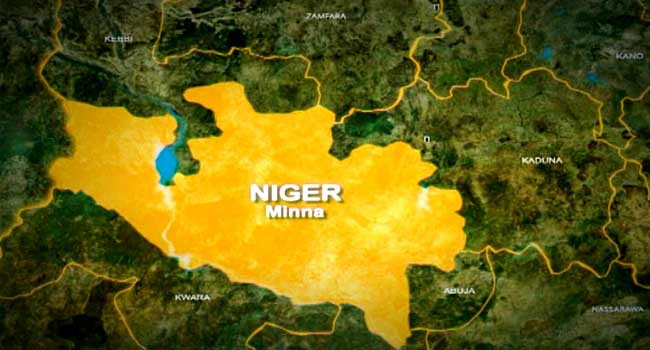Thw Yoruba Nation agitator, Sunday Adeyemo, popularly known as ‘Sunday Igboho’ would have been flown to Nigeria on Monday night by a waiting helicopter, following his arrest in the Republic of Benin, if not for the intervention of some Yoruba people at the airport.
His lawyer, Mr Yomi Aliyu, speaking during a radio talk programme on Rave FM, tagged ‘Frank Talk’, on Wednesday, said Adeyemo had boarded a plane going to Germany when he was identified by a passenger who said he was a wanted man. According to Aliyu, “He was already in the plane in Cotonou, on his way to Germany with his wife and his brother. Somebody fingered him out that he is a wanted person.
“He was brought down with the wife and brother and a fracas ensued because he was to be flown to Nigeria by a standby helicopter. “But the wife and the brother put up a fight and started shouting at the airport, which attracted some other Yoruba indigenes and they came to their rescue.”
Meanwhile, some Yoruba people residing in Cotonou, Republic of Benin, thronged the nation’s court where it was believed that extradition hearing of Igboho will be held on Wednesday. In a video on the Facebook page of Olayomi Koiki, Igboho’s media aide, the Yoruba in Cotonou were seen singing solidarity song and demanding freedom for Igboho.
They also demanded an independent nation of Yoruba people, adding that they have confidence in the Benin Republic justice system to give Igboho justice. Their expectation was, however, dashed as the authorities of the Benin Republic failed to arraign him in court. Hearing into his extradition process after he was arrested at a Cotonou airport on Monday night, alongside his wife while they were on their way to Germany did not hold. Many of his supporters who had waited to see him left the court premises immediately they found out that he would not be arraigned.
According to the British Broadcasting Corporation (BBC) Yoruba, the court where the trial was to take place is called Paequet and checks indicated that Igboho was still being kept in detention at the Brigade De Criminel, near Berlier.
In Ibadan, Oyo State, youths, numbering over 500, stormed major streets and neighbourhoods in a peaceful protest, demanding the release of Igboho. The protesters, who took off from the frontage of Ig- hobo’s house at Soka, on Wednesday, also called on traditional rulers in Yorubaland to use their influence in securing his release.
The demonstrators marched through Soka, Sanyo, Felele and converged on the Music House, housing the Fresh FM of the popular gospel music artiste, Yinka Ayefele, on Lagos bypass of Challenge, before they returned to Igboho’s residence. They displayed various placards, while some of those who spoke to the Nigerian Tribune charged Yoruba monarchs not to abandon Igboho in his present travail. Armed policemen later dispersed the protesters as they shot in the air to scare them. Armed policemen took over the Soka junction and other strategic locations before they later left the area.
Speaking on the development, the Aare Ona Kakanfo of Yorubaland, Iba Gani Adams, expressed sadness over the way the Federal Government had trampled upon Igboho’s rights, even as he demanded that government must be fair in handling his case and that of other agitators.
In a statement by his media aide, Mr Kehinde Aderemi, the Yoruba warlord urged the Federal Government not to trivialise issues of agitations in the country. Iba Adams, while picking holes in the manner by which the Federal Government had treated Igboho in recent time, posited that the call for a Yoruba nation came to the front burner in Nigeria’s political history because of growing injustice, nepotism, corruption and maladministration in the various sectors of the country.
Wondering how the Federal Government had decided to dissipate so much energy in clamping down on agitators of self-determination, the Yoruba generalissimo, however, maintained that the country would have been a lot better for the mass of the people if such energy had been used in dealing with various problems bedevilling it in all areas, including economic, political and social challenges, as well as the rising spate of insecurity.
Source: Nigerian Tribune






